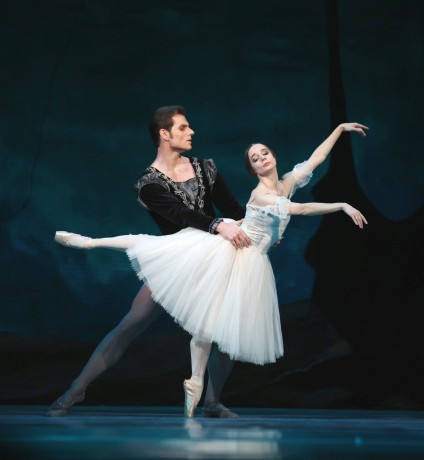"Not to be afraid of the future" Michal Krcmar Interview

"Not to be afraid of the future" Michal Krčmář
Interview by Pavol Juráš
(DOWNLOAD FULL INTERVIEW HERE...)
Michal Krcmar Interview - Not to be afraid of the future
In 2013, we have created our big profile interview. It was beginning of an era in which I wanted to pay a tribute to Czech dancers working abroad. Don't they spread fame and admiration for our country just like top athletes? Michal Krčmář had his first great successes on his plate. Today, he continues like years before and remains a rather unique, truly first-rate artist on the world stage. Generations have changed. He is dancing as guest-stars at the most prestigious galas, changing planes, stages and cities like socks. Many ballet companies invite him to save them, because Michal can be relied on, his word is valid, his performances are constantly dazzling. He alternates his closely watched guest-starring in London with work with John Neumeier in his home scene. He changes the main role from one to another, his suitcase and flight tickets are changing all the time, and yet I have to say that he is still the enthusiastic, cheerful and pleasant companion for a conversation. His politeness and good manners have not disappeared, the energy and enthusiasm is still there. He is not afraid of any question or topic, he wants to answer everything, it is extremely interesting and maybe it will help other guys find their way to ballet. Michal is simply Michal. Some conversations can easily fade out, but with Michal it is always a ride. I often have to put a lot of energy to get the dancers to talk about other topics, not only about the dance and dance again. However, talking to Michal is relaxing, chatting with a star dancer like with your best friend over a drink. Years ago we touched on his childhood, dreams, imaginations, from a boy who wanted to be a firefighter, a secret agent, a police officer and god knows what else to his current career. Today we are here and we are taking look at the stock of big roles, performances, successes, in his mischievous storytelling which is pure joy and great fun to listen to. Eleven years is a long time, especially in the life of a dancer, and his amazing career is definitely continuing.
As I've said for sure years ago, I stick to my principles and rules. It helps me not only in my career, but also in my personal life. It's still me, just an older version. Of course, people get a little wiser with age, things are changing, but my principles and priorities don't. So maybe that's why I still feel the same "goofy". Forgive me for the expression, but that's how it is. Some childhood dreams are long gone. I gave up on my secret agent career. I couldn't stand the secrecy... (laughs)
At that time, I chose the title for the interview "I don't feel special enough for anyone to read about me". I must say that it was one of the most impressive interviews because you had courage, you were honest and humble. Your answers about behaving at school, secretly kissing a classmate during class, partying and many other things, no one admitted to it in the interview and kept the image of a passionate artist for the sacred art of the dance (laughs).
I gotta say nothing has really changed in my view on things. The question is: Was I advanced then or Am I underdeveloped now?... (laughs). Before, I would "slap" the truth in everyone's face without a remorse and was convinced that honesty would get you right where it should. Sometimes it might be the best solution, but perhaps with time I have learned to present the truth more diplomatic way, not everything is just black and white. It is important to know the right time to be honest. When to say what needs to be said and when to remain silent. It is often better to stay quiet... You know the Czech saying: give a hint to a smart person and kick a stupid one.
So is Finland and the National ballet still your home?
Yes, it's still my home and, even though I originally came only for one season, I'm very glad I stayed. Thanks to that, I have my family. So I am happy that I decided to stay. I think it helps everyone to look back after a while and think about whether you are proud of your actions or shamed of them. Make a decision. To try to live certain way. Look back and see that thanks to the principles and decisions, you can be proud of yourself, in career and mainly in personal life. Simply act to not be ashamed of your actions in a future.
During the last decade, ballet has changed. World-class companies have struggled and are struggling with new rules and new generations of dancers who will not let anything get in their way. Powerful bosses have fallen, rules are being introduced to protect dancers against bullying and discrimination.
I think it's very good. Finally something is happening. The situation is quite alarming in some companies. Of course, everything healthy balance, but I'm very happy that things are moving towards improvement. Dancers are starting to have their word, they're starting to understand that they also have rights and that they don't have to nod and agree to everything out of fear just to keep their jobs.
Have you witnessed all of this...
During my career, I have seen and heard things that even now, when I start to remember, I want to "vomit". I am an optimist and believe that the situation is moving forward, to more humane side. Unfortunately, I know that there are still companies where the management completely abuses their position and destroys careers of dancers, sometimes leaving ugly scars on the lives of young, but also older and more experienced artists. Often the artistic director, ballet master or choreographer has a very important position and in many cases has huge impact on the careers of artists. Slimy remarks, comments on body parts and sexual harassment. I have witnessed all of this in our company, it is no secret, it has been written about everywhere, but thanks to the dancers coming together, there is no place for anything like this in Helsinki anymore!
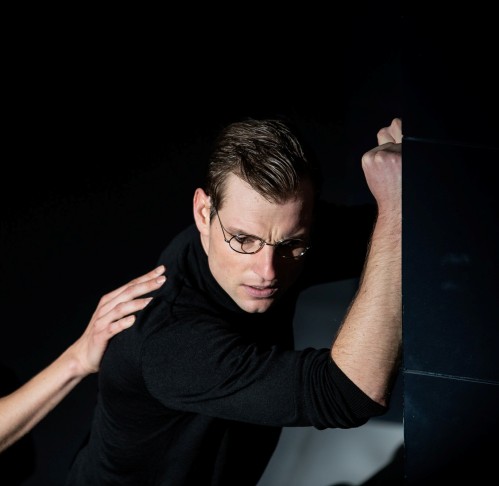
Michal Krcmar as Gustav Von Aschenbach - Photo Roosa Oksaharju
On the other hand, somebody may use their power to discredit or eliminate someone just because they feel hurt or not appreciated... How do you feel about this?
I also believe that it is not so easy to "destroy" an innocent person. I believe that the truth will always prevail and people with their hearts on the right place will always support such a person in a tight situation. The truth is that sometimes, due to jealousy and bad-wishing individuals, often without a shred of talent or rational thinking, people find themselves in a rather difficult situation, but as I said, the truth will find its way sooner or later. At least most of the time... Let's say an innocent man with experience, abilities and character in the right place does not have to defend himself much in such situations. His actions, his history, his respect of the others and the team of people who should stand firmly behind him and speak for him.
In connection with this, I keep thinking about your words from last time: "ballet is for intelligent people and it is admirable how this quality is visible on stage."
As I get older, I may stand by this statement even more. I don't mean to offend anyone. It's perhaps about self-understanding, for who this profession is and for who is not at all.
Can you say for who it is, based on your experience?
Ballet is a physically very demanding profession, everyone knows that. How it is mentally like, not so many people can imagine it. There are many intelligent dancers who, early on in their work in the company, or even during their school times, understood that this profession is not at all what it seems, and they quit before they could really start "making a career". Being a successful professional dancer depends a lot on intelligence, hard work and luck. Knowing whether a person is really in the right place or is doing this profession just because they like to stay on points or wearing a tutu. Loving our job is the foundation, it simply cannot be done without love. I say this from very close experience. My brother Martin used to be a dancer and after two years in a professional company he realized that it was not for him. Fortunately, he realized this soon enough and left. Today he is more than happy with his decision to leave.
So what is your conclusion on this topic? How would you sum it up today...
Being on stage and merging perfectly with the music, the story and the choreography must be the most natural feeling inside a dancer's heart. That feeling that everything is exactly as it should be, open to all the senses and enjoying every moment. What I mean by that is that finding and understanding all this within yourself requires a lot of work and a certain intelligence. As I mentioned, it is not an easy profession, and if the eyes are the windows to the soul, then the stage is the window to the heart. On the stage you can see and feel everything about the artists, what kind of persons they really are. I think Mikhail Baryshnikov once said: "Let me watch you dance for one minute, and I will tell you who you are."
Good sentence. So, are the times when choreographers shouted and threw chairs in studios definitely over?
It depends on where, in what country, company, politics, but I believe that soon YES. There is simply no place for this behavior in modern times and for me it is completely unthinkable. It is time to change it and break the generational chain of ego. If the generations before us were not able to change it, then it is our turn, otherwise there will be no end to it.
How do you feel about the casting policy, for example, when a boss or choreographer tells you: “You’re not the type for this, you’re not good at it.”
This is exactly the moment where the dancer or artist should precisely know, what he or she is best for, what kind of type of the dancer, just what we talked about the intelligent... This is really a matter of opinion, whether it is opinion of the boss, the choreographer, your colleagues, or the audience. Of course, there are certain types of dancers for certain roles. What certain characters should look like and so on... . That’s just the way it is. It depends on the dancer’s ability to convince the people who are talking to the casting, director or choreographer that they should be casted. I’ve seen terrible casting decisions based only on how the dancer look like, and it was a disaster, because when they started moving, it just didn’t work at all. It can also be the other way around, when someone underestimated, given the opportunity, can convince everyone of their firstly wrong done decision. That’s why I say it’s a matter of opinion. It depends on the boss’s or choreographer’s ability to spot who is good at what. The most important thing is to know the people you are casting, to work with them, to talk to them, to know what they are capable of, and to know their capacities, reliability, work ethic, artistic side, technical abilities, and also mental stability...
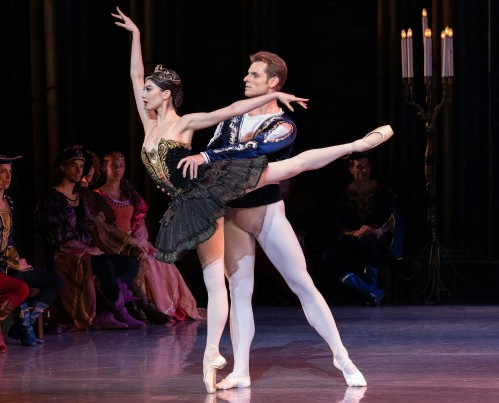
Chloe Misseldine, Michal Krcmar Swan lake London Coliseum photo - Caroline Holden
You travel a lot as a guest. Do you see different approaches and moods in the companies?
You don't even know how. The differences can be enormous. My quick adaptation to where and how they work helps me with these changes. I have experienced situations where I was doing the main role with a dancer who was dancing a demi-solo role and we had a part of the choreography together. Well, I saw the dancer for the first time only after the curtain opened during the first performance. It also happened to me that five minutes before the performance I met the ballerina for the first time and she told me that I had learned the old version from the video. (laughs) So I had to quickly learn a new version of the choreography, or four hours before the premiere of Swan lake I met my partner for the first time and we started putting together what we were going to dance that evening. Anyway, these situations are usually the cause of injuries or other unplanned events. It just depends on your abilities how you deal with these conditions.
I'm glad you're bringing your typical humorous elements into our conversation again...
These kind of situations would never happen to a guest artist in Helsinki, everything here is planned, rehearsed, often even over rehearsed... The number of stage rehearsals for certain productions is sometimes bigger than the number of the performances (laughs). I remember my premiere of Prince in Swan lake fifteen years ago at the Prague State Opera. The performance started at five o'clock then. At four o'clock the lighting guy came to show me the lights, or rather the darkness, for Prince's monologue in the first act so I could try something on stage for five or ten minutes. That was my only stage rehearsal. We can say the general rehearsal for my first Swan lake.
Today it is often emphasized that taste has changed a lot, technique rules. Acting, type, charisma are not as important as technical skills, jump height and number of pirouettes.
In my opinion, it only looks like this "at first glance", because at the helm of the ensembles are people who really understand our profession (at least should understand it) and therefore I believe that, especially in Europe, true art still triumphs over overvaluation of technique. It is good that the boundaries of technique are moving forward, but it must never be at the expense of our true artistry.
What is the importance of social media? Sometimes a dancer with funny videos is more successful than a great but introverted ballerina.
Everything is still evolving. Today, social media is also a form of communication. The audience and artists can know more about each other, they are closer and sometimes they can even become friends. I don't see this as a bad thing. I would like to emphasize, in art quality is important, not quantity. So the success of artists is not determined by the number of people who follow them on Instagram. This is just a trend that may pass someday. Social medias are today's tool and me as artist I feel like I have to keep up with nowadays tools. Even I have official profiles on almost all platforms. Artists simply have to be seen and heard a little. It is also an opportunity to reach out for a new audience, a new generations and bring new viewers to theaters.
Since we met, you have danced many new interesting roles. At least according to my preferences (laughs), for example, the ambiguous character of Cupid in Sylvia by the living legend John Neumeier, that is a great character in terms of type – I think for you.
It was actually three roles in one. What to say, it was a wonderful experience. Working with John, who was incredibly nice, was a pleasant surprise. Enjoying every time you go on stage in a different character and costume, changing your personality in a split second and receiving deserved applause for the work you have done. Simply every artist’s dream.
Among the new creations, you are still faithful to demanding and difficult classical ballets. You are even currently guesting in various world theaters. Isn't it a lot of stress when everyone is waiting for you to pull out a difficult variation or coda?
Of course, it is not easy, but it is my job. Plus, I love classics and it is the main reason why I still dance. It is about doing something about it every day, respecting our work and our body, regular training, work on yourself and your physical condition six days a week. When a dancer goes through this process regularly, the rest is basically easy. I think that stress and uncertainty come when a dancer is not mentally balanced, physically prepared, or is technically unsure. Maybe because they do not regularly go through this important form of preparation, they have personal problems... Because of this, they feel out of shape and can be without confidence before entering the stage. Personally, I cannot say that I get stressed before performances, rather I have great respect for them. Every time I go in there, I realize my responsibility, responsibility to the people that bought the tickets, but I'm definitely not afraid of it. I can say that I always look forward to it. I enjoy challenges. The harder the performance, the better it is for me. If you pay attention to proper preparation, there is definitely no reason to stress, but to enjoy the performance much more.
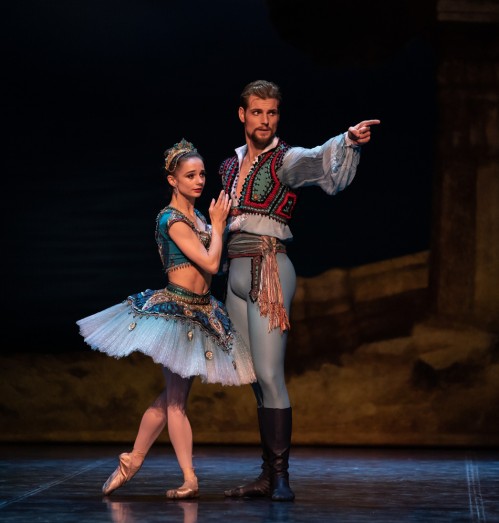
Corsaire Maria Kochetkova Michal Krcmar Anna Marie Holmes, photo Roosa Oksaharju
You've prepared Conrad in Anne-Marie Holmes's spectacular version of Le Corsaire, Solor in Makarova's version of La Bayadère, there's still Siegfried and Swan Lake.
Corsaire in this version was a big milestone for me. I remember watching a VHS tape from ABT with Julia Kent, Ethan Stiefel, Paloma Herrera, Angel Corella and Vladimir Malakhov at school. Incredible cast. I absolutely fell in love with this version. I would never have thought that almost twenty years later I would be dancing the main role, which was danced by the legendary Ethan Stiefel. A dream come true. La Bayadère is another amazing ballet that I love to perform. I have had the honor of dancing Solor in five different versions and companies over the past twelve years, but I still have to say that Makarova's version is simply my favorite. Maybe because it was my first. Swan lake after fifteen years, seven different versions and theaters is probably the most frequent performance. I have to say that out of all the princes, Siegfried is my favorite prince character to portray.
I saw an extraordinary performance from you in the new version of Spartacus. Few companies are performing this ballet, and in the new version by Lucas Jervies, I would say that there is perhaps more dancing in it for you than in the iconic version of Grigorovich.
It was a very surprising experience for me to dance in this choreography. Few people know that I have danced Spartacus for the second time, because years ago I accepted Jiří Pokorný's invitation to tour in Italy with the Pilsen Ballet company. When I found out that we would not be doing Grigorovich in Helsinki, I was terribly disappointed. I did not even want to hear anything about our upcoming version. How wrong I was. It was a big lesson for me. It opened my eyes a lot. There is definitely only one Grigorovich, but I enjoyed Jervies' Spartacus so much that I would not be afraid to say that it was probably my favorite production in the last five years. Definitely a perfect production for large companies. The audience loved it, it was an incredible time. For the first time after Covid, the theater was open without seating restrictions. All performances completely sold out. A production full of fantastic music, interesting choreography, passion, perfectly prepared fights and battles. In short, a ballet that I literally fell in love with.
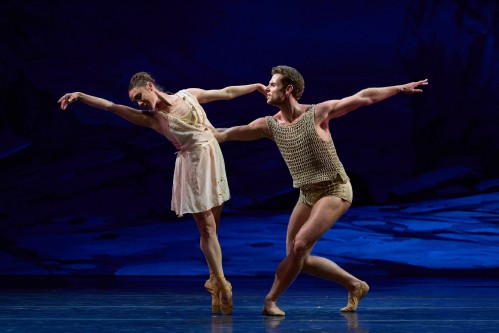
Yolanda Correa, Michal krcmar in Spartacus by Lucas Jervies photo Carlos Quezada
The issue of new versions of classic titles still divides audiences. You were invited to a major new version of Raymonda by Tamara Rojo. Did the new libretto help you? Is this Jean better than the “classic” one?
I think the most important thing is how everything is done and prepared. I definitely don’t like to see traditional elements trampled on without remorse. It’s a matter of taste and respect. The idea of this Raymonda is certainly not bad, but in my opinion this version didn’t have the impact on the audience that it could have. Maybe it was too long for the average viewer. I liked how the character of Abderachman was done, he was the best made character.
I would say that you have moved a lot from being a prince all the time to complex characters. Vronsky in Ratmansky's Karenina.
It is definitely very fulfilling, because my repertoire has really grown in many ways over the past few years. Alexei's Karenina is a really interesting production and it is for a long talk. In such ballet, the relationship and connection with the partner is important, in the studio or on the stage, and understanding outside of work as well. I remember that time we had no time to rehearse at all. We all learned the choreography very quickly and believe me, it is definitely not an easy version to remember. Linda and I had our first rehearsals scheduled for just the two of us after our rehearsal on stage, so everything was completely reversed. Actually, at the stage rehearsal, I screwed up almost everything I touched. Of course, Alexei had just arrived. In the end, everything turned out super well. He was very accommodating and working with him was really good.
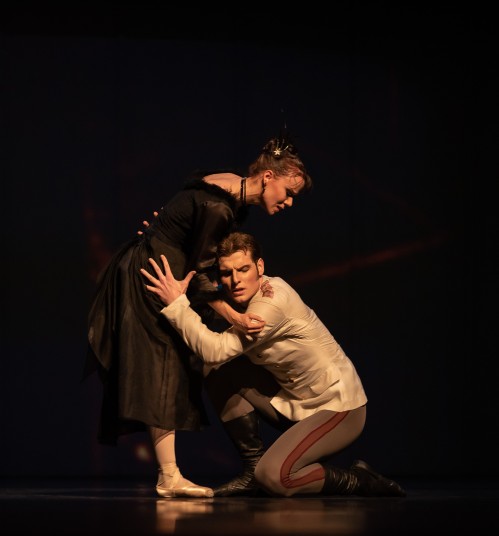
Linda Haakana, Michal Krcmar Anna Karenina by A. Ratmansky photo Roosa Oksaharju
Another main role in the ballet Jekyll and Hyde...
...it's a "master piece". Choreographer Val Caniparoli and I spent hours working in and outside of the studio. Long conversations about dramaturgy, musicality and acting... We created a lot from the first step almost a year before the premiere. It was a fantastic experience. I was able to intervene a lot in the choreography. We created the last solo in the ballet in a very interesting way. He told me about his vision, but he admitted that he didn't know what to do. I suggested that he put on music and record me improvising. In the end, he liked it so much that we repeated it three or four times, he watched all the videos carefully and later chose what he liked. So I can say that the entire last solo of Edward Hyde in the ballet is my improvisation. Today, this production is starting to be performed on the other side of the globe and it is a great success.
You have even danced in Dust by Akram Khan, whose ballets are not often seen in the repertoire of other big companies.
Our company had the privilidge of performing this production and it was an incredible choreography and a beautiful memory, because it was also the last collaboration with my long-time partner and legend. The unique Salla Eerola, with whom we have experienced so much on and off stage. Working on the choreography itself was a completely new experience. Physically very demanding, sometimes very fragile, then on the contrary very explosive. In one part she has her legs hooked around my waist for over three minutes, while she leans back and we both are forced to use a lot of counter balance, at the same time we are both only on my legs the whole time. So a very special experience from the first rehearsals...
The last time it was the big hot new Dracula…
It is a unique production, also thanks to the fact that the choreographer used music by Wojciech Kilar, who composed the soundtrack for the famous film Dracula directed by Francis Ford Coppola. Standing on stage as Dracula was almost like acting in a film. I often imagined myself as Gary Oldman during stage rehearsals. (laughs)
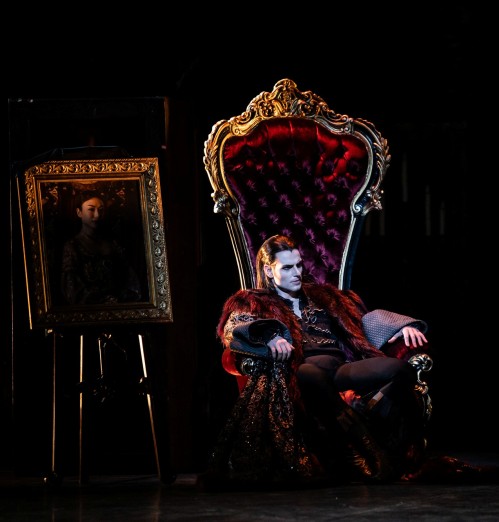
Michal Krcmar as Dracula by K.Pastor photo Roosa Oksaharju
You have danced a gigantic repertoire. Is there a dream role? One that you would like to dance?
Not at all, if I would end my career tomorrow or dance for ten more years, wouldn't change much for me . What I mean by that is that as long as the work fulfills me, I want to do it the best possible way. I don't want to draw an imaginary line anywhere, but as long as it makes sense to me, I will gladly dance whatever comes to my way. I take my work more as a daily adventure and patiently wait to see what the next role or the next production will bring. Many of the roles that I danced have fulfilled many of my dreams long time ago and I would very much like to return to some of the characters. For example, I danced Manon ten years ago and the character of Des Grieux is truly a role that I would very much like to dance again, but there are many such roles – Onegin, Spartacus or Basilio...
I think we have to mention your new role as Aschenbach in Neumeier's very personal ballet based on the iconic novella Death in Venice. I hope I don't offend you when I say that you don't exactly strike me as the type who would fall in love with a young man to the point of self-destruction in his desire for absolute beauty. (laughs) That must be a big challenge for you. Artistically and emotionally.
You're definitely right, I agree that it's more of the opposite of the character that I actually am. I didn't even audition for the role, but John knows me from past and believed that he needed to cast someone with a certain personality and experience for the task. I definitely didn't see myself for the role at first. I even told him that face to face. He replied to me: "That's why you're perfect for it!" He motivated me a lot with that, and as I mentioned earlier, it was a really irresistible challenge, so I went all in.
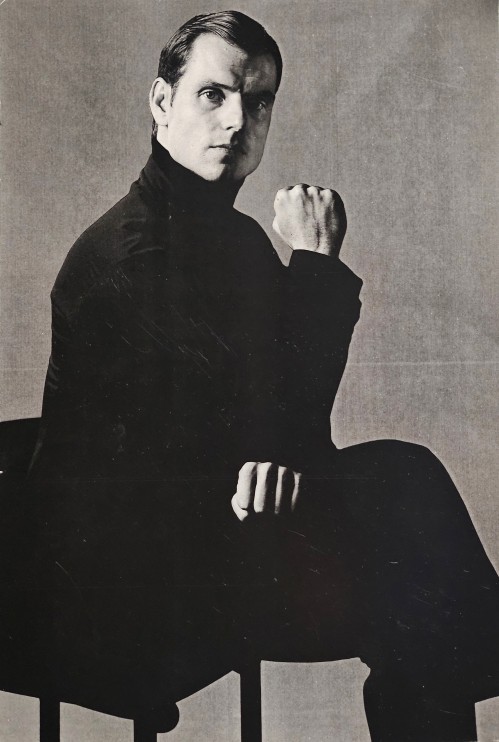
Michal Krcmar as Gustav Von Aschenbach - Photo Jouka Valkama
Who would not want to work with such a legend. (laughs)
I must say that it was not easy at the beginning of the preparations. Aschenbach is a choreographer in ballet, not a writer like in the book. I must say that I really enjoy acting and this was a fantastic challenge. It is very physically demanding, especially the first thirty minutes. The performance is long and has many specific acting twists, turns and demands. John knew exactly what he wanted and at the same time left me a huge space for my personal embodiment of his vision. In the end, John cast me in the premiere cast and the premiere was very successful for me in media as well. The main thing is that the audience liked it and John was very satisfied, even moved by our work. He promised that he would return to Helsinki soon for something big again.
But John is very intellectual in his ballet, exploring the boundary between the creator and his inner world. The delicate balance between a person on stage and in private. Do you ask yourself similar challenging questions regarding your life dedicated to dance? Or have you ever lost control in a character? Or have you fallen for something? For someone?
Quite the opposite, it is important to separate your profession from your personal life. It helps a lot to connect it only in one direction, I mean using your personal experiences, feelings, situations and project them on stage. It often happens that it is harder for me to fall asleep during preparations or after performances, individual parts and steps of the choreography are still running in my mind, but that is quite normal with emotionally demanding roles. Quite often it is also adrenaline, but I have never lost control or fallen for a role.
Today, even large companies are staging performances that are very theatrical. Dancers dance in water, are naked, have demanding props, and have to improvise a lot. Is there anything that would really make you say: sorry, I won't dance in this?
I definitely believe that YES. I can't say what it would have to be, but if it is against my principles, or there will be a moral dilemma to dance a role, I would definitely stand behind by my believes. Fortunately, I have never encountered anything like that. Of course, there are also productions in which I have danced and I would love to forget and pretend they never existed. I've worked with people who I believe were on the verge of madness, but the interesting thing is that I almost never see such "artists" again after the collaboration with them. It's like they disappeared off the face of the earth (laughs)... That's simply part of our job as in any other work place, not only in art. We all know that.
Michal, you're not going to say, what would make you to say enough and make you leave? (laughs)
I really can't think of anything specific, but if something like that happens in the future, I'll let you know... (laughs)
Okay, I'll wait. These days is normal that people have the opportunity to comment on social media, write emails etc... But often these are negative and quite frustrating comments, sometimes with offensive content. Has it happened to you that you've received something like that?
Almost every day. Maybe it's a sign that you're doing something right (laughs)... But seriously. If an artist receives mostly negative reactions, maybe it is the sign to start thinking about retiring. As for my negative criticism, I try to compare the rate of positive with negative ones. You can often find the right percentage of success of your work in the ammount of positive and negative criticism. It's good that today everyone can say whatever they want. What's even better is that everyone can perceive and listen to whatever they want as well. So I have no problem completely ignoring criticism from experts and intellectuals who have no idea what they're writing about. Criticism is a very good thing, but you have to know who to let criticize you.
What would you recommend to young dancers?
Patience brings experience and experience teaches us patience. At a young age, one wants everything as soon as possible, but everything has its time and everyone has their chance waiting somewhere. The important thing is to be ready for it and not miss it. Respecting the daily routine of classical training is important at any stage of your career. Train six times a week. If not ballet, then something. It is simply a priority to continue the routine. Laziness is a "friend" who likes to borrow money and not pay it back.
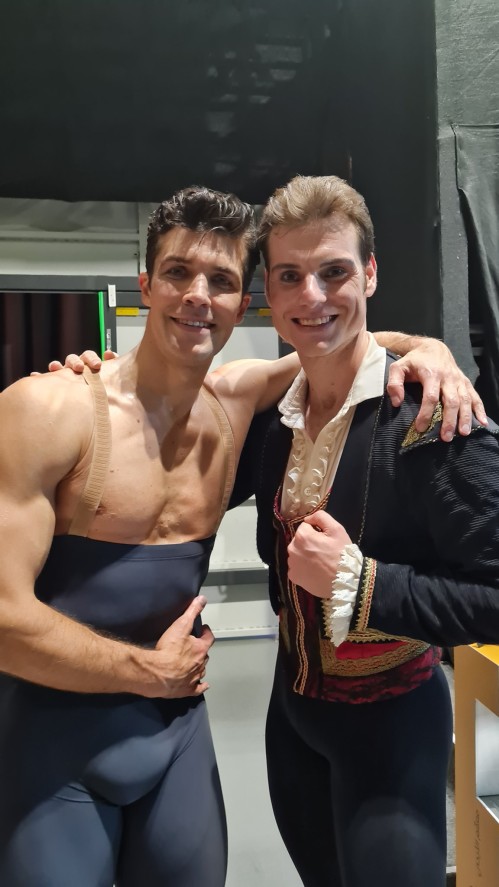
Roberto Bolle, Michal Krcmar Dubai Expo 2020
You perform at the highest class gala. Roberto Bolle and friends, and other top events. Did you learn any interesting tricks, exercises, inspiration from your colleagues?
At every such event I learn something, I also pass something on to others, but most importantly it is always a fantastic experience with the best dance artists from all over the world. I am always learning something new. I think the most important thing is to know your body and listen to what it needs. Working with an experienced physiotherapist who knows how to prevent major health problems, prevent injuries, but it all starts with the dancer and his ability to analyze his body.
In the meantime, a lot of personal things have happened. Like your wedding. Plus, your wife is Italian, so you are a truly international couple.
Stefania is a huge support to me. I often leave them at home with my daughter alone for a few days. Recently I was even in London for three weeks guesting and my wife just supported me and she didn't say a word that she was tired or something like that, while she had to dance all the performances in Helsinki, me in London, our daughter was with a hired baby sitter and my wife was just running between the theater and home...
You've helped me straight into the second great event, being a dad.
Being a father and a husband gives me tremendous strength and motivation. My daughter is everything to me, and even on stage during demanding acting scenes I think of her. It's exactly as you said. Thanks to the fact that we are an international couple, we also speak three languages at home. Our daughter speaks perfect English, Czech and Italian. She's even starting to understand a little Finnish and the Sicilian dialect, which is very different from Italian.
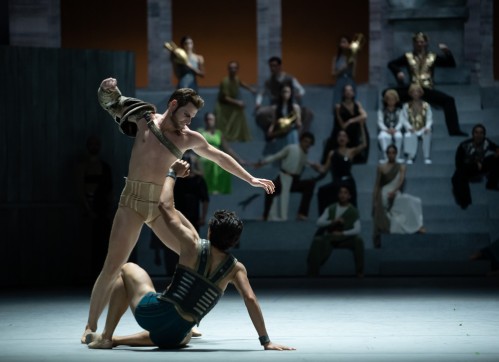
Michal Krcmar, Martin Nudo Spartacus by Lucas Jervies photo Roosa Oksaharju
Do you think about what will happen next if one day you find out that four pirouettes is a problem? (laughs)
I'm open to anything that comes my way, even quitting ballet completely. I don't think about it too much. There are many of my colleagues and friends who claim that I would be a good artistic director, but there is a right time for everything. We will see what the future brings. I am not rushing into anything...
Last time you spoke very openly, inspiringly about optimism, the joy of life, you followed the situation in the Czech Republic, politics, sports. You had clear opinions on many things that young people at that age probably do not think about yet. Who is Michal Krčmář now?
I would say the same person with more wrinkles. (laughs) What helps me to live a full life is to always be aware of what you have and not focus on what you do not have. To ignore people who make you unhappy and surround yourself with people who make you feel good. Not to live in the past. Not to be afraid of the future. To focus on the present, the present moment and enjoy it best way you can.


